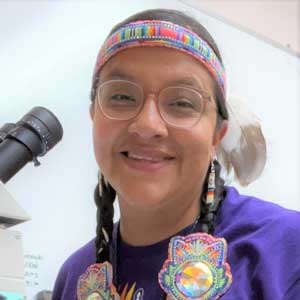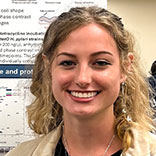
Nina Salama, PhD
Professor, Human Biology Division
Professor, Public Health Sciences Division
Affiliate Professor, Basic Sciences Division
Dr. Penny E. Petersen Memorial Chair for Lymphoma Research
Affiliate Professor, University of Washington Department of Microbiology

Jacob Frick
I am interested in how Helicobacter pylori adapts to the hostile and ever-changing environment of the host gastric epithelium. I use next-gen sequencing data to look at large, structural genetic polymorphisms that arise over chronic colonization. I characterize the functional effects of these polymorphisms using an array of molecular tools, proteomics, and microscopy.

Camilo Gómez-Garzón
My overarching research goal is to understand the molecular biology of bacteria, especially those traits of gastric pathogens that are relevant to virulence and infection. Namely, my work in the Salama lab is focused on studying how H. pylori interacts with species of the oral microbiome and establishing the significance of this interaction for stomach cancer development.

Kayleen Lederman
My work is focused on understanding the mechanisms governing the unique helical cell shape formation of H. pylori. I am investigating the function and dynamics of cell shape determining proteins and their impacts on peptidoglycan synthesis patterns using a variety of bacterial genetics and microscopy techniques.

Cheyne Littlesun
My name is Cheyne Littlesun. I am a dedicated mother of three incredible children, ages 11, 9, and 7. Balancing the joys and challenges of motherhood with my academic pursuits has been a journey of unwavering determination. In the realm of academia, my research journey is marked by a profound focus on understanding the complexities of Helicobacter pylori (Hp) infection and genetic polymorphisms in the context of gastric cancer development. I delve deep into the allelic diversity of the Cytotoxin-associated gene A (CagA) and its significant impact on immune activation. My goal is to contribute to addressing the health disparities associated with gastric cancer.

Christian Loyo
I am interested in understanding the influence of horizontal gene transfer and mobile genetic elements on the virulence and evolution of Helicobacter pylori. I am using genetic and computational analyses to identify and characterize mobile genetic elements in diverse strains of H. pylori.

Ciara Pike
I’m Ciara, a research technician in the Fred Hutch Post-Baccalaureate Scholars program. My current project has been engineering and validating a versatile gene induction and depletion system in Helicobacter pylori. The future goal for the depletion system is to study essential shape-determining protein MreB but can be applied to any H. pylori protein.

Niyati Rodricks
I am interested in the impact H. pylori cell shape plays in pathogenesis, including its contribution to niche colonization, persistent infection, and eliciting host response. To explore this, I will use mouse models and 2D differentiated gastric organoids.

Jazmine Snow
I am interested in how Helicobacter pylori infection impacts gastric cell biology to promote cancer development. To investigate this, I utilize gastric organoids and mouse model systems.